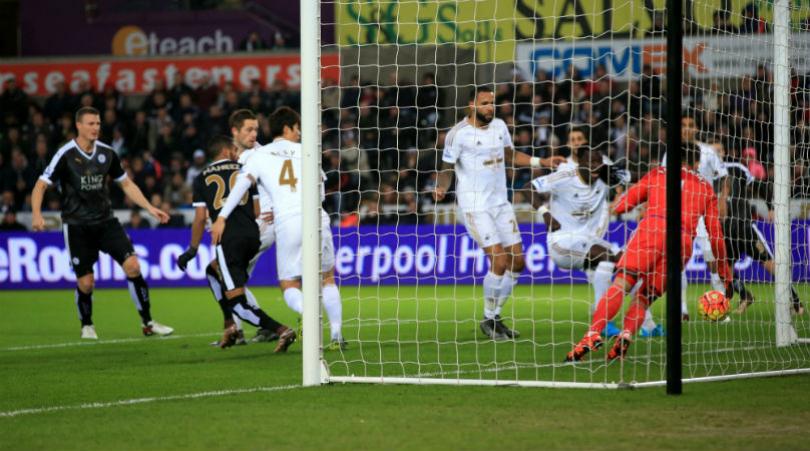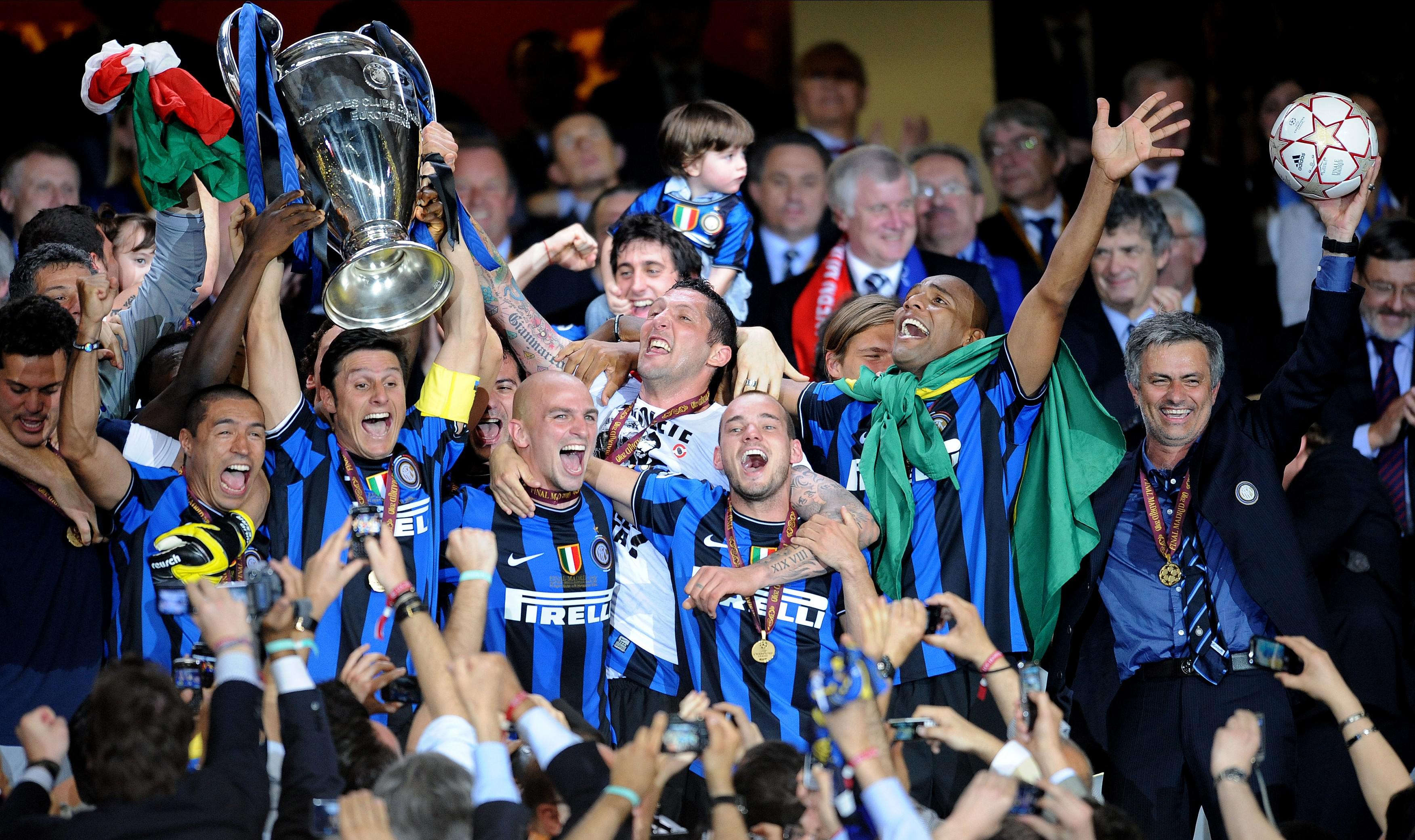The 13 most pressing items in Pep Guardiola's Manchester City inbox
The former Barça boss was officially unveiled over the weekend, but what are the big issues facing him at the Etihad Stadium? FFT's Andrew Murray assesses…
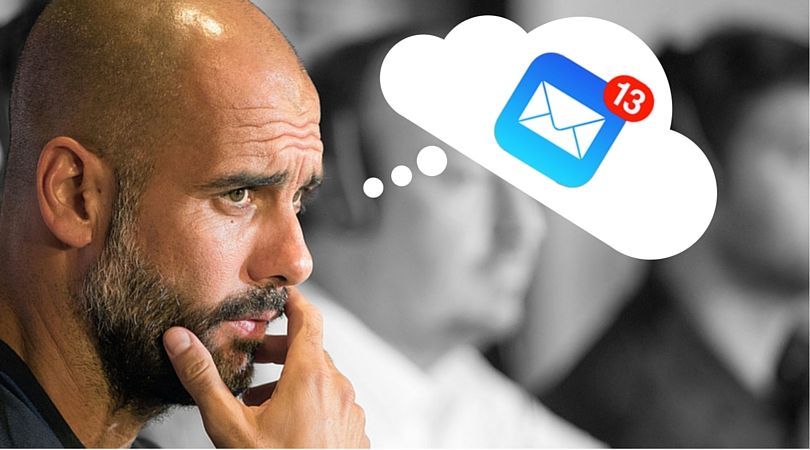
Pep Guardiola looked relaxed as he strolled into work on Monday morning ready for his first day at the new office. Having been introduced at Manchester City's Cityzens event over the weekend, he was immediately assailed by Noel Gallagher, there to stuff a microphone into his face, as City players of old shook his hand and the assorted entourage grabbed a quick selfie with him.
When met Pep: In picturesVIEW: 4 July 2016
Amid the trumpeting and constant fanfare (#itbegins), Pep talked a good game trading Citizens banter with crowd-pleasing training ground anecdotes. Now things get serious as Guardiola takes charge of a club desperate to see a return on their exorbitant investments. Here we run through the size of the task at hand…

Talk of Yaya Toure leaving Manchester City is nothing new, ever since his 31st birthday celebrations two years ago were irrevocably marred by a perfunctorily tweeted greeting, below-average cake and the lack of Bugatti Veyron entirely. It’d never happen to Roberto Carlos. Just saying.
Toure is still capable of moments of brilliance – he takes a mean free-kick and his left-footed curler against Dynamo Kyiv in the Champions League last 16 prove that – but it’s hard to shake the feeling that the 33-year-old’s best years are behind him
Toure is still capable of moments of brilliance – he takes a mean free-kick, and his left-footed curler against Dynamo Kiev in the Champions League last 16 proved that – but it’s hard to shake the feeling that the 33-year-old’s best years are behind him. Centuries-old grandfather clocks take less time to crank into life. They’re about as mobile, too.
Yaya ToureGolazo de Cruz Azul vs Chivas jejejeje6 July 2016
For what it’s worth, Guardiola rates the marauding Ivorian – Toure was a regular in three seasons under the Catalan at Barcelona, even as a now-unthinkable centre-back in the 2009 Champions League Final – but watching the City No.42’s tokenistic trotting when the opposition counter-attack isn’t the sort of high-energy pressing expected by his would-be coach.
Toure and his high-maintenance agent Dimitri Seluk might be careful what they wish for.
Get FourFourTwo Newsletter
The best features, fun and footballing quizzes, straight to your inbox every week.
Yaya Toure won't be the only City player looking over their shoulder or desperately trying to impress over the next month ahead of the new season beginning. Pep has big decisions to make across the squad, whether revamping the attack or finding a settled solution to the centre of defence.

Close your ears Wilfried Bony, you might not like this bit. Guardiola doesn’t like centre-forwards at the best of times – just ask Samuel Eto’o, Zlatan Ibrahimovic and Mario Mandzukic – so a man who has never looked comfortable at the Etihad will surely not survive the cull.
Wilfried Bony in training this morning. [] 6 July 2016
Eliaquim Mangala has looked similarly shaky in 18 months in the northwest and doesn’t fit the mould of a ball-playing centre-back capable of beginning moves that Guardiola so prizes
Eliaquim Mangala has looked similarly shaky during his 18 months in the north-west, and doesn’t fit the mould of a ball-playing centre-back capable of beginning moves that Guardiola so prizes. It’s hard to compare Gerard Pique and Javi Martinez to the Frenchman. Ditto Martin Demichelis, who has left the club this summer. There are even rumours that the physio-bothering Vincent Kompany may be for the chop.
Elsewhere, Samir Nasri is a poor man’s David Silva and energy alone may not be enough to keep walking yellow card Fabian Delph in Manchester, though the latter could be reinvented as a zippy left-back under Pep. Noted bench ornament Richard Wright, though, has finally retired from... well, nothing much really.

Despite his aversion to centre-forwards, Guardiola’s work this season with Robert Lewandowski proves he can work with strikers, so Sergio Aguero should flourish
Kevin De Bruyne is the perfect Pep player: dynamic, flexible and intelligent enough to play in three positions. The Belgian’s excellent form before a knee injury should reinvigorate a squad that has looked increasingly short on creativity next term.
Raheem Sterling should also be a Pep project, whether as winger, playmaker or false nine. Guardiola has been linked with the former Liverpool man before at Bayern Munich and should inspire more from the Sterling whose recent performances have dismayed the masses.
Despite his aversion to centre-forwards, Guardiola’s work last season with Robert Lewandowski proves he can work with strikers, so Sergio Aguero should flourish. So too David Silva, even if the Spanish schemer appears to be on the wane. The fact Guardiola allows his players total attacking freedom in the final third – “it’s my job to get you there, it’s your job to finish it,” is his attacking motto – should benefit those four immeasurably.
The Catalan coach’s propensity to promote from the youth team should also give opportunities to smooth midfielders Aleix Garcia and Bersant Celina, who both impressed in the FA Cup defeat to Chelsea.
As for new recruits, Paul Pogba is an obvious target, but Champions League football is a must. Even more likely is Thiago Alcantara who followed Guardiola to Bayern, after first blossoming under the Catalan at Barça. They share an agent, so there seems only one outcome.
Inevitably, given the club's vast financial resources Guardiola will be backed in the transfer market.
Who comes in and how successfully they adapt to the club and Pep's training methods, as with every club, will go a long way to determining what heights the club climb to over the coming seasons.

Entirely self-taught, the German centre-back has been perhaps the biggest beneficiary of Guardiola’s wisdom – the pair talk one-to-one constantly – yet Boateng won’t move
City need central defensive reinforcement, of that there is no arguing. Athletic Bilbao stopper Aymeric Laporte has signed a new contract with the Basque boys, though, and Guardiola can forget about raiding his old club for one player in particular. Right from his first training session at Sabener Strasse, die Roten’s manager was immediately struck by Jerome Boateng’s natural talent. Entirely self-taught, the German centre-back has been perhaps the biggest beneficiary of Guardiola’s wisdom – the pair talked one-to-one constantly – yet Boateng won’t move.
Remember his season at Manchester City? Not many do: he played only 16 league games, rarely convinced and couldn’t wait to leave. Don’t expect him back in Manchester any time soon, even if he’d be following his mentor.

A lot has been made of director of football Txiki Begiristain and chief executive Ferran Soriano’s presence at the Etihad as the Guardiola rumours swept the press, and with good reason. Guardiola demands control and must trust his board for him to stay at a club. Knowing this, City have played a long (and very clever) game to eventually snare their top managerial target.
In establishing a Barcelona-like model, with a head coach who trusts young talent, they hope to be more than just a rich man’s play thing
Begiristain is a former team-mate from the Dream Team that won Barcelona’s first European Cup in 1992 and served as director of football for los Blaugranas for Guardiola’s first two seasons as first-team coach, leaving when president Joan Laporta resigned in the summer of 2010. The pair are still firm friends.
Soriano is another Barcelona connection, who was vice-president at the Camp Nou from 2003 until 2008. Guardiola left in 2012 after falling-out with former president Sandro Rosell and felt increasingly isolated at Bayern after Uli Hoeness was imprisoned for tax evasion in March 2014.
In five years, City want to be semi-self-sufficient, with half of their players coming from the academy. In establishing a Barcelona-like model, with a head coach who trusts young talent, they hope to be more than just a rich man’s plaything.
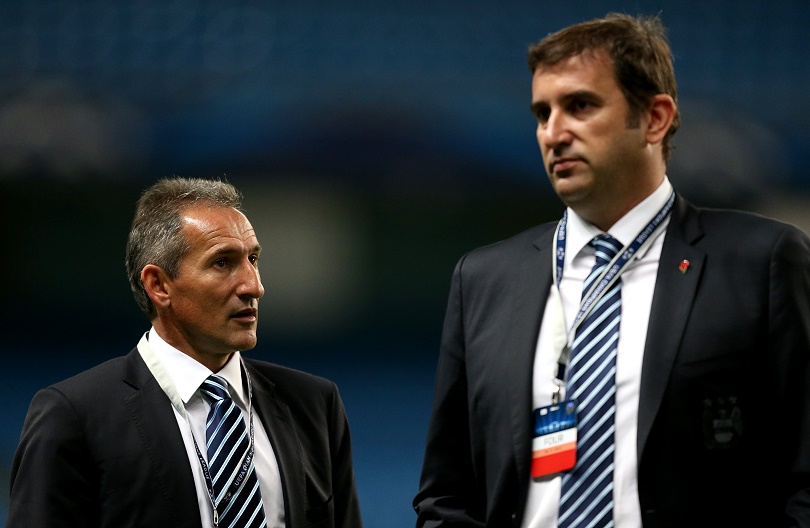

Though Guardiola’s Bayern have increasingly deployed a back three, expect his City team to begin life with four defenders
Guardiola doesn’t do things by halves. He pores over the opposition dossiers provided by head of analysis Carles Planchart, looking for the slightest chink to exploit with assistant coach Domenec Torrent. Both are following Pep to Manchester, so expect more tactical variation from game to game.
Planchart watches the previous six matches, coming up with 50-60 bite-size moves to add further detail, while Torrent and Guardiola separately analyse the data to come up with their plan.
Though Guardiola’s Bayern have increasingly deployed a back three, expect his City team to begin life with four defenders. The Catalan is acutely aware of aerial bombardment his team will face as British managers, rightly or wrongly, perceive this to be his principal weakness. With a back four, he should have the centre-backs to cope.
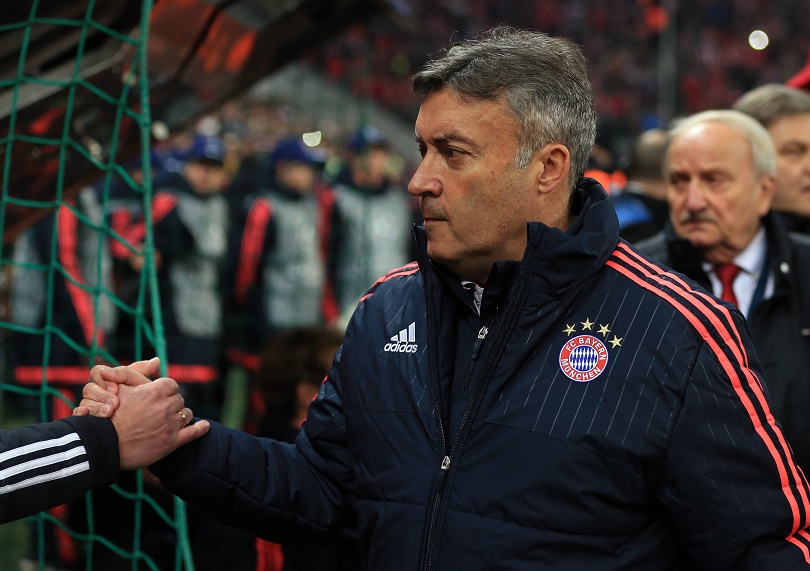
Initially, training will feature extensive fitness drills, every one of which will include ball work to replicate the efforts required during matches. In Guardiola’s first seven weeks at Bayern, there were 60 training sessions, frequently including two per day to get the players up to speed. As such, there won’t be time to work on a hitherto alien three-at-the-back system.
- RECOMMENDED 9 Pep Guardiola formations from the last year demonstrating Bayern Munich's tactical flexibility

From my point of view, to subjugate yourself to a team’s discipline, is to make a team. That’s football and view it as another way to develop your own personal talent
Guardiola has long been obsessed by tactical discipline. As a player, he was amazed by two of his team-mates’ capacity to toe the coach’s line at Barcelona.
“I’ll never forget the lesson Jari Litmanen and Ronald de Boer gave me,” he wrote in his autobiography. “These were two guys that, because of injury and other reasons, weren’t that well received by the fans, but they couldn’t see what I did every day at training. They were superlative. Positionally and tactically, they’re different to the rest.”
It was here that Guardiola first appreciated the notion of players who submit to the tactical system, something he had already admired in Litmanen and De Boer’s former team, 1995 Champions League winners Ajax.
“They were marvellous,” he said in La meva gent, el meu futbol. “I’m talking about their tactical discipline and their capacity to apply it at exactly the right moment, above any kind of individual talent.
“Too often when we talk about tactics, it’s in a disparaging way, as if the most talented can’t be used in such a system. From my point of view, to subjugate yourself to a team’s discipline, is to make a team. That’s football; view it as another way to develop your own personal talent.”
In short, Manchester City players must be willing to submit completely to Guardiola’s tactical plan, or face exclusion from the matchday squad.

Part of the reason for Guardiola’s recruitment is that City want to be half-self-sufficient in the next five years, instead of relying on Sheikh Mansour’s endless chequebook [does anyone, anywhere, still use cheques? – Ed.]
The big question mark surrounds whether the academy can cope, or whether Guardiola will recruit from elsewhere, like Coman, Kimmich and Juan Bernat
Though his commitment to youth is perhaps overstated – he promoted Sergio Busquets, Thiago and Pedro at Barcelona primarily because he’d already coached them in the B team – Guardiola nevertheless trusts in young players. Kingsley Coman and Joshua Kimmich have both flowered at Bayern ahead of more established and experienced operators, so expect Guardiola to select players more open to being moulded in the Catalan’s image.
The big question mark is whether the academy can cope, or whether Guardiola will recruit from elsewhere like he did with Coman, Kimmich and Juan Bernat. Kelechi Iheanacho has thus far been the exception to prove the rule at City, but centre-back Tosin Adarabioyo and midfielders Aleix Garcia and Manuel Garcia – who all impressed in City’s controversial FA Cup fourth-round defeat to Chelsea earlier this season – seem the likeliest to step up.
9. Attack is the best form of defence
Everybody knows that Guardiola's teams like to attack and to do that by pressing high and with the ball.
However, one big question is over whether the ex-Barça coach's ideas will translate over to the hurly-burly Premier League.

Guardiola’s teams tend to have excellent defensive records not because of 6ft 4in bruisers who head anything in sight (he’s not Tony Pulis, after all), but because of a constant recycling of possession and endless training sessions which focus on defensive shape. Zonal marking is a prerequisite and anyone who struggles will find playing time severely limited. Just ask €25m centre-back Dmytro Chygrynskiy, who lasted just a season at Barcelona in 2009 because he was unable to adapt, despite Guardiola liking him personally.
Zonal marking is a prerequisite and anyone who struggles will find playing time severely limited
Crucially, it’s the defence that start attacks. “The centre-backs provoke the opponent,” said former Chelsea boss Andre Villas-Boas, explaining the system in Another Way of Winning by Guillem Balague, “invite them forward, then, if the opponent applies quick pressure, the ball goes to the other central defender and this one makes a vertical pass – not to the midfielders, but to those moving between the lines further forward”.
Of City’s current centre-backs, only Nicolas Otamendi seems capable of performing such a role, which is why Mangala and Kompany look so vulnerable. Making the system work in England has played a significant part in Guardiola’s Premier League arrival. If he can make it work in the home of the more direct, most physical league in Europe, he feels he can legitimately be considered one of the all-time greats.
Best of Rondo | 2015/16 Season Bayern makes it look so easy... 19 June 2016

The Catalan’s stance remains that you can ask him anything you want in two, sometimes three, press conferences he gives each week
That Guardiola doesn’t give one-on-one interviews isn’t exactly news – the Catalan’s stance remains that you can ask him anything you want in two, sometimes three, press conferences he gives each week. Guardiola has a lot of personal friends in the Spanish media – collaborating with two of them for his autobiography – and not once did he waver which initially upset many, before the 'rule' was broadly accepted by all.
The British press pack, many of whom remain hostile towards any manager who refuses to brief beyond their contractual obligations, is unlikely to be so reverential. Sam Allardyce and, in the past, Harry Redknapp tend to keep the press onside by briefing off the record or attending to the press before or after scheduled press conferences.
It isn’t just the media, either. Guardiola will be a prize scalp for a number of Premier League bosses who feel eternally overlooked for top jobs. Expect early attempts by Pep’s rugged rivals to get under his skin. Now who might do that?

Refuse the offer, however, and you’ll effectively be ostracised, as Zlatan Ibrahimovic, Eto’o and Mario Mandzukic have found out
Guardiola anticipates problems with his players, especially big names, and seeks one-to-one conversations often by taking them out for dinner. During the treble-winning 2008/09 Barcelona season, Pep took Thierry Henry – disgruntled at still playing left-wing, despite an early promise he would play centrally – for some food to explain the decision, after Samuel Eto’o unexpectedly stayed at the club. Henry was vital to that treble.
Refuse the offer, however, and you’ll effectively be ostracised, as Ibrahimovic, Eto’o and Mario Mandzukic have found out. Guardiola won’t waste time on a player who doesn’t want to listen. Fringe Manchester City players, it’s your call.

Though Manuel Pellegrini is well liked at the Etihad, he doesn’t have the same constant dialogue with his players that Guardiola likes to establish
It's been well reported that Guardiola learned the effectiveness of a coach talking to his players regularly from his three-season spell under former Barcelona boss Louis van Gaal from 1997. Indeed, City’s incoming manager couldn’t believe that such conversations weren’t commonplace with every coach under whom he played.
“I love talking about football,” he wrote in his autobiography. “I like to talk about different concepts and consider different points of view. There’s nothing extraordinary in doing that, we all do it all the time with friends, team-mates and even journalists. But when player and coach talk face to face, we’re looking for the same thing – the best for the team.”
Though Manuel Pellegrini is well liked at the Etihad, he doesn’t have the same constant dialogue with his players that Guardiola likes to establish. Pep loves talking tactics with his charges – and they’d do well to follow his lead.
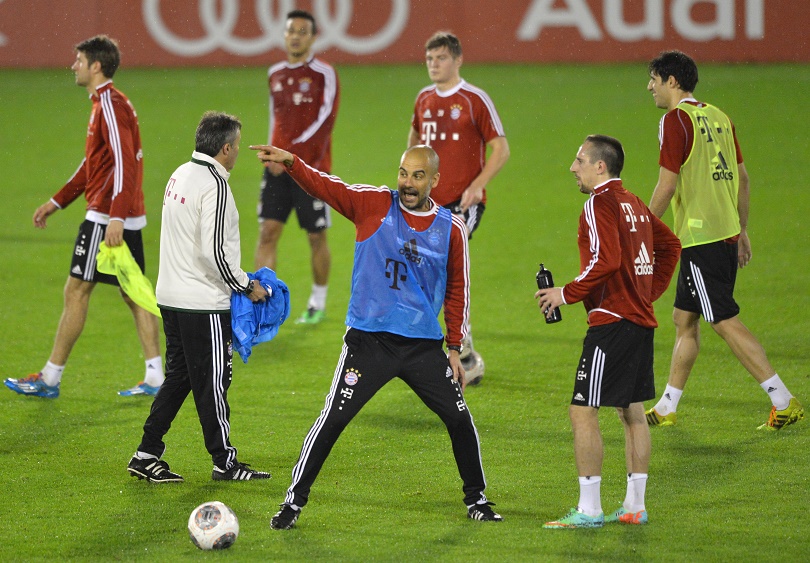

True, the Jose Mourinho spectre looms large across the Manchester divide, but there’s one manager who will most worry Guardiola in the Premier League: Ronald Koeman.
Team-mates at Barcelona, they’ve never faced each other in the dugout, but as a player the Catalan could already see the future coach in the Dutchman.
“He’ll be a great coach at a big team,” wrote Guardiola in his autobiography. “He’s lived with this team and seen how it’s become great first-hand. Ronald sees football in a way that no one else does. It’s simple, if he’s already as good as he is by playing behind all of us now, imagine how good he’ll be watching from the bench.
“Koeman is universally recognised and respected, and this characteristic is fundamental with management because it’s a synonym for credibility. He also needs pressure to give his best.”
When the old friends meet for the first time, Guardiola will have spent much of the previous week deep in concentration.
Andrew Murray is a freelance journalist, who regularly contributes to both the FourFourTwo magazine and website. Formerly a senior staff writer at FFT and a fluent Spanish speaker, he has interviewed major names such as Virgil van Dijk, Mohamed Salah, Sergio Aguero and Xavi. He was also named PPA New Consumer Journalist of the Year 2015.
